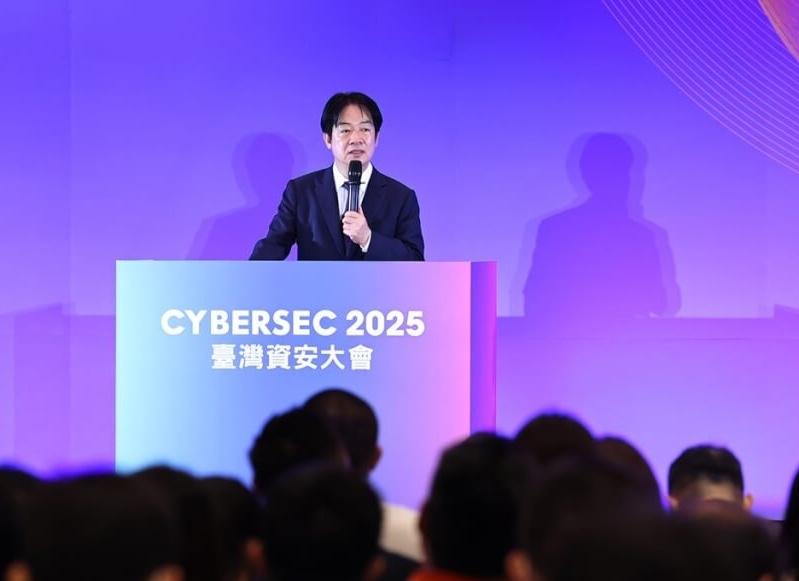Taiwan is the key of the first island chain and at the forefront of international cybersecurity risks, President William Lai (賴清德) said today.
The comments came as part of Lai’s opening remarks at this year’s Cybersec Expo in Taipei, which runs until Thursday.
In recent months, hospitals and companies have been targeted by ransomware attacks, which prosecutors have traced to Chinese hacker groups.

Photo: CNA
As the incursions become increasingly severe, the government has put forward three strategies to increase the nation’s resiliency in the information sphere, Lai said.
No person or company can face these attacks on their own, Lai said, adding that last year saw an average of 2.4 million incursions a day, more than double the year before.
In the past few months, Taiwan has seen several attacks using “Crazy Hunter” ransomware, hitting hospitals, schools and public companies, showing that Taiwan is under increasing threat from Chinese hackers, Lai said.
After Lai took office last year, he established the Whole-of-Society Defense Resilience Committee at the Presidential Office, inviting experts from civil society to participate, he said.
The goal is to continue strengthening critical infrastructure, such as telecommunications networks, financial services and transportation, and make the nation a bastion of cybersecurity, Lai said.
The government’s recently announced cybersecurity strategy lays out three goals from this year to 2028, strengthening society-wide cybersecurity, supporting the cybersecurity industry and building emerging technologies in the defense sector, he said.
The Ministry of Digital Affairs is currently amending the Cyber Security Management Act (資通安全管理法) to use a two-pronged approach on improving cybersecurity protection for all industries, Lai added.
The Cybersec Expo brings together more than 400 cybersecurity brands to showcase their latest technologies and solutions.
The three-day event also includes about 300 talks, featuring speakers such as Czech Chamber of Deputies Deputy Speaker Jan Bartošek and US Naval War College assistant professor Jason Vogt, among others.

A small number of Taiwanese this year lost their citizenship rights after traveling in China and obtaining a one-time Chinese passport to cross the border into Russia, a source said today. The people signed up through Chinese travel agencies for tours of neighboring Russia with companies claiming they could obtain Russian visas and fast-track border clearance, the source said on condition of anonymity. The travelers were actually issued one-time-use Chinese passports, they said. Taiwanese are prohibited from holding a Chinese passport or household registration. If found to have a Chinese ID, they may lose their resident status under Article 9-1

Taiwanese were praised for their composure after a video filmed by Taiwanese tourists capturing the moment a magnitude 7.5 earthquake struck Japan’s Aomori Prefecture went viral on social media. The video shows a hotel room shaking violently amid Monday’s quake, with objects falling to the ground. Two Taiwanese began filming with their mobile phones, while two others held the sides of a TV to prevent it from falling. When the shaking stopped, the pair calmly took down the TV and laid it flat on a tatami mat, the video shows. The video also captured the group talking about the safety of their companions bathing

A classified Pentagon-produced, multiyear assessment — the Overmatch brief — highlighted unreported Chinese capabilities to destroy US military assets and identified US supply chain choke points, painting a disturbing picture of waning US military might, a New York Times editorial published on Monday said. US Secretary of Defense Pete Hegseth’s comments in November last year that “we lose every time” in Pentagon-conducted war games pitting the US against China further highlighted the uncertainty about the US’ capability to intervene in the event of a Chinese invasion of Taiwan. “It shows the Pentagon’s overreliance on expensive, vulnerable weapons as adversaries field cheap, technologically

Starting on Jan. 1, YouBike riders must have insurance to use the service, and a six-month trial of NT$5 coupons under certain conditions would be implemented to balance bike shortages, a joint statement from transportation departments across Taipei, New Taipei City and Taoyuan announced yesterday. The rental bike system operator said that coupons would be offered to riders to rent bikes from full stations, for riders who take out an electric-assisted bike from a full station, and for riders who return a bike to an empty station. All riders with YouBike accounts are automatically eligible for the program, and each membership account